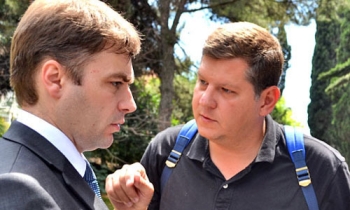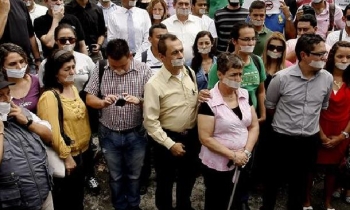Liberals may be pleased that New York Times reporter Judy Miller left prison to testify about Scooter Libby. She wasn't protecting a whistleblower after all, but a man engaged in a whisper campaign to silence a whistleblower.
It was a "bad" leak, liberals argue. Testifying might jail media Machiavellis like Mr. Libby and Karl Rove. So it was right this once for a reporter to give up a confidential source.
John McManus
But those who value open government have much more to lose than gain when reporters agree to identify confidential sources.
No sooner had Mr. Libby finished his perp walk than congressional Republicans called for a new investigation of another reporter's notebook. The target this time? Washington Post reporter Dana Priest, who revealed secret CIA detention camps in Eastern Europe.
Meanwhile, Mr. Libby's lawyers have indicated they will demand access to more journalists and more of their confidences than the limited agreements Prosecutor Patrick Fitzgerald struck with reporters in the Valerie Plame leak. And nuclear scientist Wen Ho Lee's attorneys are seeking the testimony of reporters who worked for the New York Times, the Associated Press, the Los Angeles Times and CNN to find out who in the government damaged his reputation. The judge held Washington Post reporter Walter Pincus in contempt of court for refusing to testify.
Pandora's box is open.
Unfortunately, news media can't pick and choose between good and bad leaks in deciding when to honor promises to sources. With Time Magazine turning over its reporter's notes and a New York Timeswoman humbled, prosecutors, judges even defense attorneys like Mr. Libby's are already becoming more demanding of journalists. As they do, sources will surely become less trusting of reporters' promises.
Nor can reporters limit offers of confidentiality to "good" leaks. Journalists can rarely judge a leak before granting anonymity because only the most naïve informant spills the beans before being assured of protection. The only real out journalists have is to ignore the story. And that didn't save Judy Miller from a subpoena.
That's why Congress needs to heed the wisdom of a majority of the states and enact a federal shield law. Journalists must be able to listen to anyone's tale without being turned into police informers. Only as a last resort should they be compelled to name sources promised anonymity.









